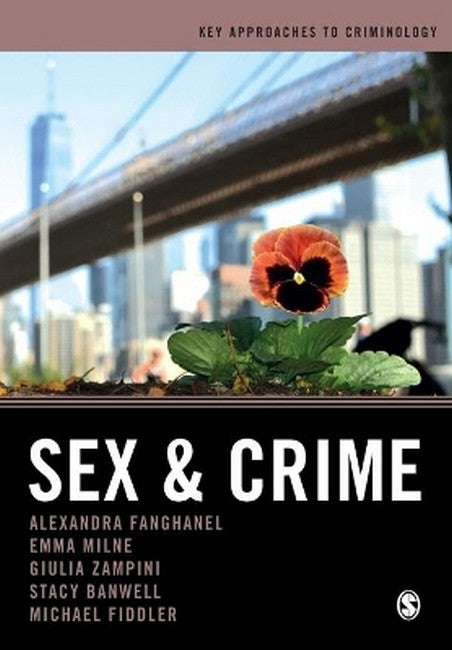Dr Alexandra Fanghanel is a Senior Lecturer in Criminology, University of Greenwich. Alexandra researches fear of crime, security, sexuality, and sexual practice in public space and uses queer, feminist, post-structuralist, and anti-colonialist approaches to analyse power and to strive for social justice. Alexandra views education as a tool through which to become free and to begin to undo the injustice of the world; that is why she is committed to radical, critical pedagogy. Dr Emma Milne is a Lecturer in Criminology at the University of Plymouth. Emma is an activist for women's rights, specifically reproductive rights and justice. Emma's research and teaching is interdisciplinary, focused on criminal law and criminal justice responses to women who are deemed to be criminal or deviant, specifically those suspected of newborn child killing and foetal harm. The wider context of Emma's work is social, cultural, and legal controls and regulations of all women, notably in relation to motherhood, pregnancy, sex and reproduction. Emma co-edited Women and the Criminal Justice System: Failing Victims and Offenders? (Palgrave, 2018), and her research is informed by and uses feminism, intersectionality, and post-structuralism. Emma's approach to law and legal research is from Feminist Legal Theory and Critical Legal Studies perspectives. Dr Giulia Federica Zampini is a Senior lecturer in Criminology at the University of Greenwich. Giulia's formal academic studies span across history, politics, social policy and socio-legal studies, but she is also interested in anthropology, ethics, and moral psychology. Giulia is attracted to a variety of theoretical and epistemological positions, including - but not limited to - feminism standpoint theory, critical theory, and critical realism. Giulia's research interests centre around evidence and policy; drugs, prostitution, morality, harm reduction, decriminalisation, and prison education. Giulia is dedicated to research, activism, and advocacy for harm reduction across drug policy and prostitution policy and committed to enabling platforms for marginalised communities and knowledges, including people who use drugs and people who are incarcerated. Her current ongoing project, People and Dancefloors: narratives of drug-taking, involves team-based participatory action research through film. Dr Stacy Banwell is Principal Lecturer in Criminology at the University of Greenwich, and Programme Leader of MSc Criminology, Gender, and Sexualities, University of Greenwich. Stacy's background is in Criminology and Criminal Justice, and her current research interests are: - Gender and the violence(s) of war armed conflict, including the relationship between war/armed conflict and climate insecurity. - Gender and economic foreign policy, specifically US foreign policy on abortion. Stacy is currently reviewing the impact of President Trumps revised global gag rule (GGR) and the defunding of UNFPA in humanitarian and war-affected settings. These topics are addressed in Stacy's monograph Gender and the Violence(s) of war and armed conflict: More dangerous to be a woman? (2020). This work draws on Critical, Feminist and Visual Criminology; International Relations, Security Studies (including environmental security), Post-colonial Studies and Gender Studies. Stacy's research practice is informed by feminist standpoint theory (which she applies to both human and non-human animals) and participatory action research. Dr Michael Fiddler is Senior Lecturer in Criminology at the University of Greenwich. Michael's research has explored prison architecture, as well as the ways in which the 'gothic' and 'uncanny' can be applied to representations of imprisonment and violence. Michael's urrent project is focused upon 'Ghost Criminology' and unpacking the ways in which the conceptual metaphors of haunting and spectrality can be applied to crime and punishment.
Request Academic Copy
Please copy the ISBN for submitting review copy form
Description
Part One: Encountering Sex and Crime Chapter One: Introduction Chapter Two: Theory: How to think about sex and crime Chapter Three: Sex and crime in time and space Part Two: State, sex, and crime Chapter Four: Consent and its discontents Chapter Five: Sex and institutional cultures of abuse Chapter Six: Reproduction, sex and crime Chapter Seven: Sexual exploitation and the State Chapter Eight: Sex and war Part Three: Sex, cultures, and crime Chapter Nine: Pleasurable risk Chapter Ten: Sex and disability Chapter Eleven: Digital sex Chapter Twelve: Children, sexualisation and the law Chapter Thirteen: Illegal representations Part Four: Future Sex Chapter Fourteen: The Future Chapter Fifteen: How to change your life: hope, love, anger and other unlikely revolutionaries Glossary Bibliography

